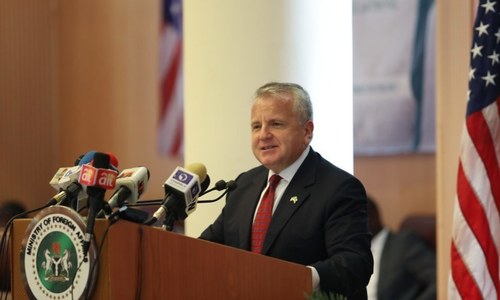WASHINGTON: Declaring Pakistan a state sponsor of terrorism will create a situation that will be difficult to reverse, will fail in forcing Islamabad to change its policies and will not help the US cause in Afghanistan.
These were the arguments that all three panelists made this week in a discussion at a Washington think tank — Woodrow Wilson Centre’s Asia Programme — to reject the suggestion.
Labelling a country “a state sponsor of terrorism, is not a surgical instrument, that’s a really, really heavy hammer”, argued Stephen Tankel, an assistant professor at School of Public Affairs, American University, Washington. “The sanctions that come with that pretty much obliterate any chance you have engaging on a whole host of other issues.”
Daud Khattak, Senior Editor, Radio Mashaal, Radio Free Europe/Radio Liberty, also rejected the suggestion because he believed it would be counter-productive. “Let’s declare Pakistan a state sponsor of terrorism today. But what next, if there’s no change? Will you take some more serious steps?” he asked.
Madiha Afzal, a fellow at the Brookings Institution, Washington, who recently wrote a book on Pakistan — “Pakistan Under Siege: Extremism, Society, and the State” — opposed the proposal, raised at various platforms in Washington.
Read: Peace talk offer to the US shows that the Afghan Taliban have evolved
“There are other avenues, less single-minded approach, to actually make Pakistan move,” she said, while urging the Trump administration to work with China to persuade Pakistan to listen to US complaints about Islamabad’s role in Afghanistan. “Pakistan will listen,” she said.
Two official statements this week — by US Director of National Intelligence Dan Coats at the Senate Intelligence Committee and by Pakistan Army Chief Gen Qamar Javed Bajwa in Munich — also have had a major impact on the debate in Washington on Pakistan’s role in South Asia, particularly in Afghanistan.
“Pakistani military leaders continue to walk a delicate line. Ongoing Pakistani military operations against the Taliban and associated groups probably reflect the desire to appear more proactive and responsive to our request for more actions against these groups,” Mr Coats told the Senate committee. “However, the actions taken thus far do not reflect a significant escalation of pressure against these groups and are unlikely to have a lasting effect,” he added.
Gen Bajwa told US policy makers that the cause of the current stalemate in Afghanistan was “not only the Haqqani network or Afghan Taliban”, it was also “the pursuit of a wrong strategy which led to their resurrection”.
He highlighted the US failure to combine its military ventures with a soft approach, providing an ideological alternative to the extremist narrative, reminding them that this “information prong aimed at discrediting the terrorist ideology” was “equally important”.
At the Washington seminar — “Changing Patterns of Extremism and Terrorism in Pakistan” — Madiha Afzal also tried to correct the perception in Washington that “ordinary Pakistanis condone, if not celebrate, the violent jihad”.
“Data shows it’s not true, 89 per cent of Pakistanis in a recent Pew global opinion poll said that violence against civilians in the name of Islam was never justified,” she said.
Mr Khattak rejected the perception that this month’s tribal protest in Islamabad was against Pakistan. “It was against the Pakistani government, asking them to remove military check-posts and recover the disappeared people,” he said. “It was not against the state of Pakistan. It was not anti-Pakistan,” he said.
He also blamed Afghanistan’s neighbours and the international community for failing to restore peace there. “Their struggle is for individual conquests, not for defeating the Taliban,” he said.
Questions about labelling Pakistan a state sponsor of terrorism were raised by two participants — a former US ambassador to Islamabad and the leader of a Sindhi nationalist group in Washington — and these created an animated discussion.
“Assistance is a form of engagement, ending it entirely takes you in the opposite direction, and when you ultimately have to engage Pakistan again, which the US will, it makes it all more difficult to engage,” said Mr Tankel while disagreeing with the proposal to end all US assistance to Pakistan.
“Those arguments are operative on the security assistance side as well,” he said. “I prefer placing new conditions that are much more realistic than the ones we had on it in the past and then enforce them.”
Published in Dawn, February 19th, 2018













































